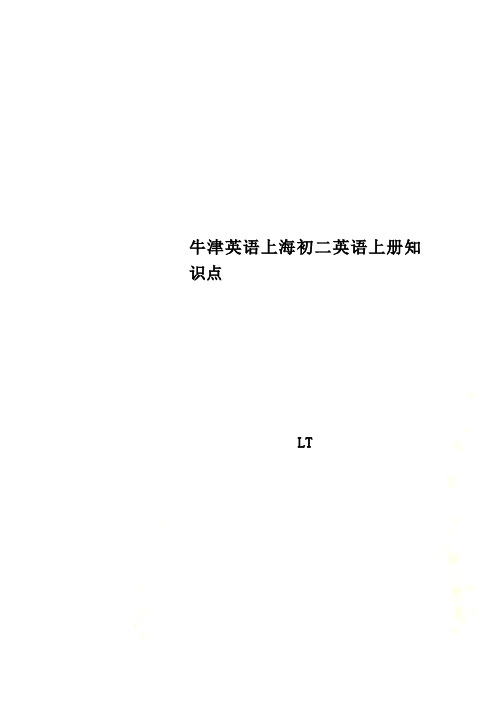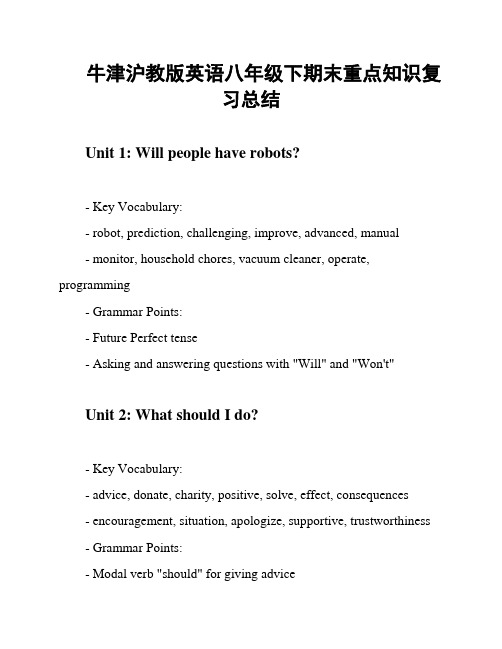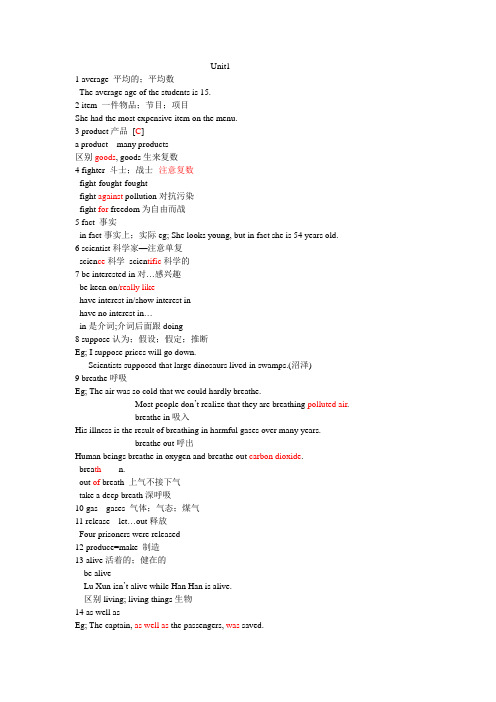上海牛津版八年级知识点
牛津英语上海初二英语上册知识点

牛津英语上海初二英语上册知识点LT牛津英语上海版初二英语上册知识点(短语、句型)MODULE11、如有always ,often, usually, sometimes, seldom, never, once a....,every...用一般现在时,第一、二人称复数后跟动词原形,第三人称单数后跟动词加's'/'es'。
2、如有now ,look! ,listen, at the moment ....用现在进行时,结构是be (am, is, are) +v-ing3、如有tomorrow, the day after tomorrow, from now on, in +一段时间, some day, next....用一般将来时,结构:will + v原\ be going to +v原(没有动词用be )4、如有yesterday, ......ago , last....just now.....用一般过去时动词加edgive sb. Sth.=give sth. to sb. 给某人某物every day每天,write down 写下,记下write it (them) down everyday每天的,日常的,how about doing sth.=what about doing sth.做....怎么样each other 互相.thanks a lot= thank you very much非常谢谢回答That's all right. =You're welcome.= That'OK.= It's my pleasure.=Not at all.Why don't you+V原...=why not+...V原为什么不help sb. with sth. 在某方面帮助别人help sb. (to )do sth.帮助某人做某事with one's help=with the help of sb.在某人的帮助help oneself to sth.请自用食物watch sb. do sth. 看到某人做了某事,(现在没有做,做过)人花费时间做某事Sb. spend some money on sth. 某人花费钱买某物Sb. spend some money (in) buying sth.某人花费钱买某物Cost: sth. cost sb. some money 某物花去某人钱pay: sb. pay some money for sth. 某人支付钱Take: It takes (took) sb.some time to do sth.做某事花去某人时间ask for 请求,要求, ask sb. for sth.向某人要某物ask sb. to do sth.要求某人做某事 a piece of 一块enjoy doing sth喜欢做某事.finish,practise, mind, miss ,consider,keep, continue,这些词语后跟动名词形式V-ingplace sth.in =put sth. in 把某物放在…里面else常修饰不定代词,关系代词或副词,也可修饰all, much,little等,else要位于其后。
牛津上海8年级上册Unit1-Unit2重要知识点及语法点复习

U1-U2Unit1 重要知识点复习词汇1会计______________2志向______________3棒球运动______________4最好的______________5大学;学院______________6角______________7梦想______________8在……期间______________9随函(或包裹)附上______________ 10高度______________11喜爱,有兴趣______________12或许;可能______________13米;公尺______________14在附近______________15拥有______________16物理学______________17很可能;大概______________18屋顶______________19滑雪______________20乒乓球运动______________21领带______________22标题;题目______________23(综合性)大学______________【语块归纳】1.own v.拥有n.独自on one’s own= by oneselfadj.自己的I have my own car.2.German n.德国人;德语Germany n.德国【注意】国籍和国人,国人变复数口诀:中日不变英法变,其余都要加s。
Chinese, Japanese, British man, French man, Canadian(s)3.maybe= possibly= probably adv.可能地【拓展】maybe和may be的区分:Maybe为副词,一般放在句首Maybe you are right.May be为情态动词+动词原形You may be right.4.near adj./ prep.附近的【反义词】far adj.远的be far away from 距离……远的【辨析】nearly adv.几乎nearby adj.附近的(一般作后置定语)There is a shop nearby.语法(一)不定冠词a.an的用法不定冠词a.an均可表示“一”、“一个”,一般用于以下几种情况中:1. 用于可数名词的单数形式前,指人或事物的某一种类。
上海牛津英语八年级上册

Units 1&2一、重点、难点归纳1.情态动词:should; ought to+动原You ought not to do it.He ought to go now, oughtn’t he?Ought I to go? Yes, you ought (to).2.动词不定式(to do)和动名词(doing)(1)动词后面只接带to的不定式的有:hope, want, would like, wish, agree, promise, decide, manage, happen, offer, plan, ask, tell, order…(2)动词后面只接不带to的不定式(即原形):使役动词:let, have, make短语:had better(3)动词后面只接动名词(doing):enjoy, practice, finish, mind, keep, suggest, have fun, look forward to, feel like, give up…二、重点句式1.make sb. do sth. 让/使某人做某事make sb./sth. +adj. 使某人/物……He made his brother repair the toy for him.We should do our best to make our country stronger and more beautiful.2.appear to do sth. 似乎要……He appears to have a lot of money.3.If possible, I’d like to have one more section about school life in foreign countries.if possible = if it is possibleI’d like to do = I would like to do 我想三、话题1,认知和了解校报,并对校报的设计发表自己的看法。
沪教牛津版八年级上册英语词汇与词组总复习(Word版)

n.灰尘,尘土
daytime
n.白天,日间
inthe daytime在白天
special
adj.特殊的,特别的
wing
n.(飞行器的)翅膀,机翼
introduction
n.引言
introducev.介绍
petrol
n.汽油
gas同义词
educational
adj.有关教育
的,有教育意 义的
educatev.教育
v.使„初次了
解„,使尝试
introduce oneselfto
向某人自我介绍
tour
v.在„旅游
n.旅游
success
n.成功
(不可数)
succeedv.成功
successfuladj.成功的
already
adv.已经,早已
用于肯定句
respect
v.慎重对待,
尊重
n.尊重
yet
adv.尚未,仍未
advise
v.建议;劝告
advise sbto do sth
建议某人做„
advise doing sth.
建议做某事„
advice n.建议(不可数)
a piece ofadvice
一则建议
several
det.几个,一些
opinion
n.意见,想法
inmyopinion依我看
whole
adj.整个的,全部的
例如
intheworld
在世界上
atschool
在学校
take pictures of
拍照
wouldlike
想要
makesb. do sth
牛津上海版英语八上各单元知识点

牛津上海版英语八上各单元知识点Unit 1: Hobbies and Sports- Vocabulary related to hobbies and sports- Expressing likes and dislikes- Present simple tense for routines and habits- Question words (what, who, where) to ask about hobbies- Expressing opinions and reasonsUnit 2: Home and Family- Vocabulary related to home and family- Describing family members and their appearance- Possessive adjectives (my, your, his, her) to talk about family members- Present continuous tense for actions happening now- Prepositions of place (in, on, under, behind, in front of) to describe location- Talking about daily routines and activities at homeUnit 3: School Life- Vocabulary related to school subjects and activities- Talking about school routines and rules- Expressing preferences and abilities- Present continuous tense for future arrangements- Question words (when, why) to ask about school activities Unit 4: Festivals and Traditions- Vocabulary related to festivals and traditions- Talking about celebrations and customs- Present simple tense for facts and general truths- Describing events using adjectives and adverbs- Expressing opinions about festivals and traditions- Question words (what, how) to ask about festivals and traditionsUnit 5: Health and Fitness- Vocabulary related to health and fitness- Describing illness and symptoms- Talking about healthy habits and lifestyle- Present continuous tense for future plans- Giving advice and suggestions- Imperatives to give instructions for exercises and activitiesUnit 6: Travel and Adventure- Vocabulary related to travel and adventure- Describing travel destinations and activities- Using there is/are to talk about places- Talking about past experiences using past simple tense- Question words (who, where) to ask about travel experiences- Expressing preferences and reasons for travel destinations Unit 7: Festivals and Celebrations- Vocabulary related to festivals and celebrations- Talking about traditions and customs- Present perfect tense to talk about past experiences- Talking about personal experiences using adverbs- Grouping words into categories (like, dislike, love, hate) - Giving reasons and explanations for opinionsUnit 8: Heroes and Icons- Vocabulary related to heroes and icons- Describing famous people and their achievements- Present perfect tense to talk about life experiences- Talking about qualities and characteristics of heroes - Expressing admiration and opinions。
牛津上海版英语八上各单元知识点

牛津上海版英语八上各单元知识梳理Unit 1 PenfriendsⅠWords:1.penfriend 笔友pen pal2.magazine 杂志a literary magazine 文学杂志women’s magazine 妇女杂志→n. magazinist 期刊编辑3.hobby 业余爱好4.chess 国际象棋chessman 棋子(pl. chessmen) chessboard 棋盘5.own 拥有own up 承认错误owner 所有者物主业主6.good/well—better---best7.architect 建筑师architecture 建筑学8.nearby adv. 在附近不远adj. 附近的邻近的9.keen adj. 热心的渴望的敏锐的灵敏的Keenly adv.敏锐地keenness n. 敏锐10.ambition 雄心抱负be full of ambition 野心勃勃ambitious adj. 有雄心的11.enclose 附上Ⅱ Phrases1.at the end 在………的末端2.be keen on 热心于做热衷于………3.play chess 下象棋4.twelve years old5. a boy called Tom 一个名叫Tom 的男孩a boy named Tom a boy with the name Tom6.best wishes 最好的祝愿7.by +交通工具= take +a/an +交通工具8.tell sb. about sth. 告诉某人关于某事tell sb. to do sth. 告诉某人做某事tell sb. not to do sth. 告诉某人别做某事9.enjoy doing sth. 喜欢做某事like doing sth.mind /practice/finish/10.speak /tell /say/talksay 说述说speak 说话发言电话来时用speaking talk 说谈话of/about tell 告诉讲述Ⅲ Sentence1.make it +adj. for sb. to do sth. it 形式宾语2.sth. +be+ to do 动词不定式做表语3.I hope you will write to me soon . 我希望你尽快给我回信hope 有可能实现的愿望wish 不大可能实现的愿望hope to do 希望做某事wish sb. to do 希望某人做……..ⅣGrammarⅠquestion words (疑问词)what、who(whom) / whose/which/when/where/how/whyhow many/much/long/far/soon/fast/often/ how many timesⅡ冠词1.不定冠词a/an的用法“不见“原因”(发元音)别施“恩”(an)特殊案例:前需要加a 的:university a usual book Europe 欧洲European欧洲人one-day trip 需要加an 的:unhappy + n. uncle unusual + n.2. 定冠词the的用法特指双方熟悉,上文已经提起。
牛津沪教版英语八年级下期末重点知识复习总结

牛津沪教版英语八年级下期末重点知识复习总结Unit 1: Will people have robots?- Key Vocabulary:- robot, prediction, challenging, improve, advanced, manual- monitor, household chores, vacuum cleaner, operate, programming- Grammar Points:- Future Perfect tense- Asking and answering questions with "Will" and "Won't"Unit 2: What should I do?- Key Vocabulary:- advice, donate, charity, positive, solve, effect, consequences- encouragement, situation, apologize, supportive, trustworthiness - Grammar Points:- Modal verb "should" for giving advice- Making suggestions with "Why don't...?" and "How about...?"Unit 3: Teenagers should be allowed to choose their own clothes- Key Vocabulary:- strict, argue, fashion, freedom, express, individuality, reasonable - uniform, appropriate, dress code, personal, decision, opinion- Grammar Points:- Expressing permission and prohibition with "should be allowed to" and "should not be allowed to"- Giving reasons using "because"Unit 4: Our world in the future- Key Vocabulary:- environment, pollution, population, renewable, energy- resources, global warming, greenhouse effect- Grammar Points:- Expressing future time using "will" and "going to"- Talking about future plans and predictionsUnit 5: Let's celebrate!- Key Vocabulary:- tradition, custom, celebrate, festival, occasion, gather- lantern, reunion, special, fireworks, delicious, fortune- Grammar Points:- Present continuous tense- Talking about future plans and arrangements using "going to" Unit 6: What are you doing to help others?- Key Vocabulary:- fund, support, organize, event, poverty, education- Grammar Points:- Present continuous tense for actions happening now- Asking and answering questions with "What" and "Where" Unit 7: What's in the news?- Key Vocabulary:- headline, article, journalist, report, interview- current, event, opinion, headline, broadcast, press- Grammar Points:- Using question words to ask about specific information- Present continuous and simple present tenses to describe news eventsUnit 8: How was your school trip?- Key Vocabulary:- adventure, trip, impressive, exciting, thrilling- fascinating, breathtaking, enjoyable, memorable, view- Grammar Points:- Describing events and experiences using adjectivesUnit 9: Our world heritage- Key Vocabulary:- heritage, monument, architecture, treasure, valuable- ancient, historical, preserve, protect, cultural, site- Grammar Points:- Past continuous tense for actions in progress in the past- Talking about past events and experiencesUnit 10: Life in the future- Key Vocabulary:- virtual reality, invention, gadget, access, revolution- Grammar Points:- Using "will" and "won't" for future predictions- Talking about future possibilities and changes以上是对牛津沪教版英语八年级下册期末考的重点知识进行的简要总结。
牛津英语上海版八年级下课本知识重点

Unit11 average 平均的;平均数The average age of the students is 15.2 item 一件物品;节目;项目She had the most expensive item on the menu.3 product产品[C]a product many products区别goods, goods生来复数4 fighter 斗士;战士--注意复数fight-fought-foughtfight against pollution对抗污染fight for freedom为自由而战5 fact 事实in fact事实上;实际eg; She looks young, but in fact she is 54 years old.6 scientist科学家—注意单复scien ce科学scien tific科学的7 be interested in对…感兴趣be keen on/really likehave interest in/show interest inhave no interest in…in是介词;介词后面跟doing8 suppose认为;假设;假定;推断Eg; I suppose prices will go down.Scientists supposed that large dinosaurs lived in swamps.(沼泽)9 breathe呼吸Eg; The air was so cold that we could hardly breathe.Most people don’t realize that they are breathing polluted air.breathe in吸入His illness is the result of breathing in harmful gases over many years.breathe out呼出Human beings breathe in oxygen and breathe out carbon dioxide.brea th n.out of breath 上气不接下气take a deep breath深呼吸10 gas---gases 气体;气态;煤气11 release---let…out释放Four prisoners were released12 produce=make 制造13 alive活着的;健在的be aliveLu Xun isn’t alive while Han Han is alive.区别living; living things生物14 as well asEg; The captain, as well as the passengers, was saved.The captain and the passengers were saved.She is beautiful as well as clever.15 nature---natural16 warn sb not to do sth.警告某人不要做某事warn---warning17 protect保护protect A from B stop A fromBprevent A fromB save A from Bkeep A from B18 chemical化学的;化学物质chemistry化学---chemical19 join the army参军(组织)Would you like to join us?join in=take part in参加活动attend 出席(学校;会议;俱乐部)20 communicate with sb和某人交流沟通communicate with one another/each other相互交流沟通21 one another=each otherone another侧重三方以上的相互each other双方的相互22 burn---burnt---burntburn---burned---burned23 replace=take the place of sb/sth24 hardly any=almost none hardly any没有什么东西25 main---mainly26 lorry---lorries27 make sb do让某人做某事28 thank sb for doing sth感谢某人做了某事29 belong to sb sb是宾格;属于;无进行无被动30 by doing sth/ by not doing sth通过做某事/通过不做某事31 what good=what advantages什么好处32 what else 别的什么;其他的..33 五个感官动词look sound smell taste feel加形容词;注意look和look at;注意well34 too在否定句中变成either35 certain---certainly当然36 for example加句子有逗号such as 加名词或动名词37 remind sb of sth使某人想起什么;提醒某人某事38 contain—container39 区别protect…from…和protect…by…看意思。
- 1、下载文档前请自行甄别文档内容的完整性,平台不提供额外的编辑、内容补充、找答案等附加服务。
- 2、"仅部分预览"的文档,不可在线预览部分如存在完整性等问题,可反馈申请退款(可完整预览的文档不适用该条件!)。
- 3、如文档侵犯您的权益,请联系客服反馈,我们会尽快为您处理(人工客服工作时间:9:00-18:30)。
上海牛津版八年级知识点
上海牛津版八年级教材是一本非常经典的英语教材,它涵盖了
很多重要的英语知识点。
在本文中,我们将会讨论这些知识点及
其重要性。
第一章:基础语法
在学习任何语言时,语法是必不可少的一部分。
在上海牛津版
八年级教材中,基础语法知识点包括动词时态、语态、情态动词、虚拟语气、名词、代词、形容词和副词等。
这些知识点是理解英
语语言的必要基础。
第二章:阅读理解技巧
阅读理解技巧是英语学习的核心部分。
在上海牛津版八年级教
材中,阅读理解技巧包括主旨大意、推理判断、细节理解和词汇
推测等。
这些技巧的掌握,不仅可以帮助学生更好地理解英语文章,也可以提高他们的阅读速度和阅读技巧。
第三章:写作技巧
写作是英语学习的重要部分。
在上海牛津版八年级教材中,写作技巧包括词汇扩展、句型转换、段落组织和文章结构等。
这些技巧的掌握可以帮助学生更好地表达自己的观点,提高英语写作水平。
第四章:听力技巧
听力技巧在英语学习中也占有重要的地位。
在上海牛津版八年级教材中,听力技巧包括听力复述、听力填空和听力选择题等。
学生需要通过不断的练习和提高,才能够更好地掌握英语听力技巧。
第五章:口语技巧
口语是英语学习的重要组成部分,但口语技巧也是学习中难点之一。
在上海牛津版八年级教材中,口语技巧包括发音、口语表达和口语交际等。
学生需要勤加练习,才能够更好地掌握英语口语技巧。
总之,上海牛津版八年级教材涵盖了很多重要的英语知识点,包括基础语法、阅读理解、写作、听力和口语技巧等。
学生需要通过不断的学习和练习,才能够更好地掌握这些知识点,提高英语学习水平。
